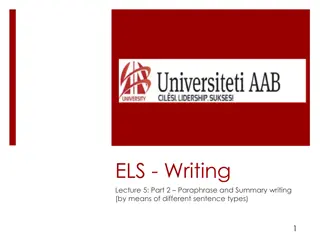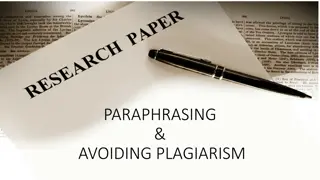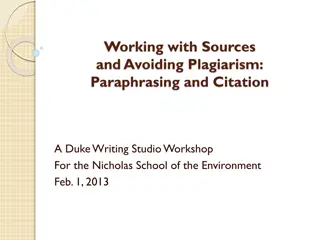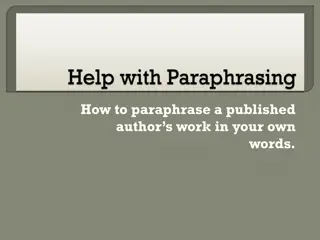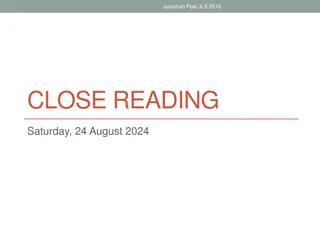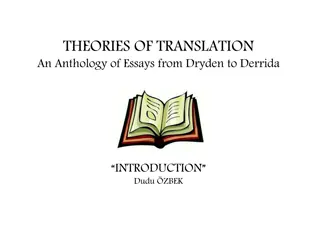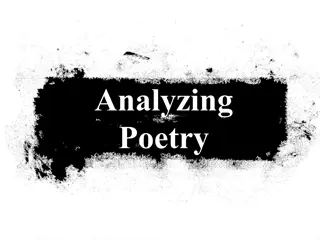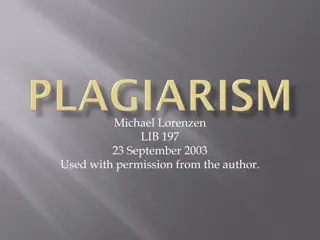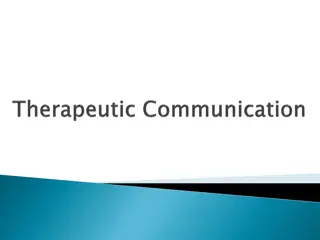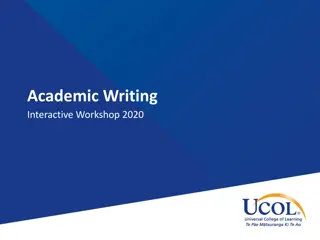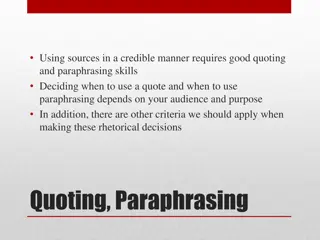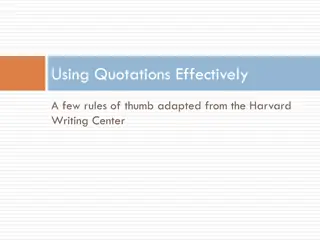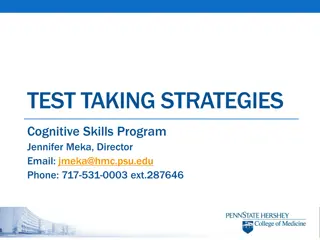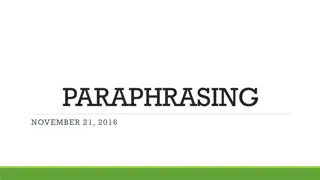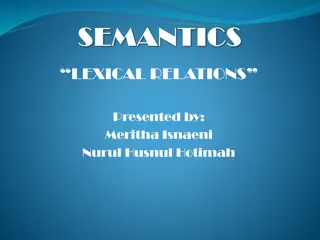Mastering Paraphrasing and Summarizing Techniques
Learn the art of paraphrasing and summarizing by practicing with exercises on rewriting passages from Rosa Parks' essay in your own words. Understand the nuances of sentence structure, word choices, and sentence types to create effective paraphrases. Discover key tips for writing a good paraphrase,
6 views • 19 slides
Mastering Paraphrasing to Avoid Plagiarism
Paraphrasing is a valuable skill that allows writers to express ideas in their own words while giving credit to original sources. By following specific steps and practicing examples, one can effectively paraphrase complex information and enhance understanding. The process helps in retaining the esse
0 views • 13 slides
Mastering Source Usage and Avoiding Plagiarism: Essential Guidelines
Effective paraphrasing and proper citation are crucial to avoid plagiarism. Understanding when to use direct quotations, paraphrases, or summaries helps maintain originality in research papers. Proper citation formats, in-text citations, and reference lists are essential components. Remember, a good
0 views • 12 slides
Effective Techniques for Paraphrasing Academic Work
Paraphrasing published author's work requires time, understanding, and persistence. Recognize the distinction between quoting and paraphrasing, emphasizing the importance of citations. Avoid excessive quoting in social sciences, preferring paraphrasing. Spend ample time reading and discussing ideas
0 views • 23 slides
Understanding Close Reading in Literature - A Guide to Analyzing Texts Effectively
Dive into the world of close reading with a focus on Jonathan Peel's JLS 2016 coursework task. Learn how to approach passages, ask text-dependent questions, and paraphrase effectively to uncover deeper meanings. Explore the nuances of language and figurative elements to enhance your analysis skills.
0 views • 15 slides
Overview of Translation Theories from Dryden to Derrida
The introduction of "Theories of Translation: An Anthology of Essays from Dryden to Derrida" offers a historical insight into translation theories. John Dryden emphasizes the importance of being proficient in both languages for translation. He categorizes translation into three types: metaphrase, pa
2 views • 25 slides
Analyzing Poetry: Understanding the Depths of Verses
Dive into the intricate world of poetry analysis through SOAPS, TP-CASTT, and DIDLS methods. Explore the elements of subject, occasion, audience, purpose, speaker, and more to unravel the layers of meaning in poems. Learn how to decode titles, paraphrase verses, uncover connotations, analyze attitud
0 views • 16 slides
Avoiding Plagiarism: Essential Guidelines for Ethical Writing
Understand the importance of avoiding plagiarism by giving credit to the original sources. Learn how to properly cite and paraphrase content to maintain academic integrity and ethical writing practices. Be cautious about using others' ideas without acknowledgment to prevent unintentional plagiarism.
0 views • 11 slides
Enhancing Therapeutic Communication in Health Education
Establishing a therapeutic relationship is crucial in health education to achieve positive patient care goals. Effective therapeutic communication involves planned acts using various techniques to ensure a shared understanding. It focuses on clear, consistent, and direct communication, incorporating
0 views • 35 slides
Academic Writing Interactive Workshop 2020
Explore the essentials of academic writing through this interactive workshop. Discover the key elements such as paraphrasing, formal language, and critical thinking. Learn how to effectively paraphrase ideas with citations, follow steps to enhance your paraphrasing skills, and engage in practical ac
0 views • 22 slides
Effective Use of Quoting and Paraphrasing in Academic Writing
Learning when to quote and when to paraphrase in academic writing is crucial for credibility. Quotations should be used sparingly, with attribution and relevant introductions. Signal verbs like acknowledges, claims, and more enhance attribution. Citing sources effectively adds credibility to your wo
0 views • 12 slides
Effective Use of Quotations in Academic Writing
To effectively use quotations in academic writing, consider the discipline, topic, and analysis when determining the number of quotes to include. Paraphrase whenever possible, and only use direct quotes for information you can't rephrase. Provide context and analyze quotes instead of merely pasting
0 views • 15 slides
Effective Strategies for Mastering Multiple-Choice Questions in Test Taking
General recommendations for approaching multiple-choice questions, common errors to avoid, and step-by-step guidance on how to read, paraphrase, and predict answers in MCQs are covered in this cognitive skills program led by Director Jennifer Meka. The program emphasizes assembling key clues, unders
0 views • 25 slides
Mastering Textual Evidence: Paraphrasing Techniques and Strategies
Learn the art of paraphrasing through techniques such as replacing subjects and words, rearranging sentences, and condensing information. Understand the difference between quoting, summarizing, and paraphrasing, illustrated with examples and tips on effective paraphrasing. Remember the R.A.P. approa
0 views • 8 slides
Understanding Lexical Relations in Language
Lexical relations play a crucial role in understanding the meanings of words in any language. They encompass relationships like entailment, paraphrase, and contradiction, shedding light on how lexemes are interconnected. Additionally, lexical fields and kinship systems offer further insights into ho
0 views • 10 slides
